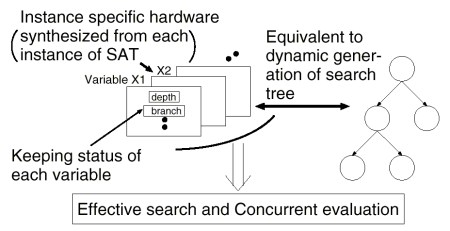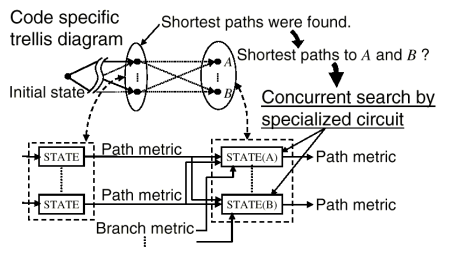Up
Solving Problems using Reconfigurable Computing
Abstract
Reconfigurable computing that employs logic circuits specialized for
each problem is feasible by combining logic synthesis technologies and
reconfigurable hardware such as FPGAs. We have conducted
satisfiability problems and maximum likelihood decoding (MLD) circuits
to investigate the effectiveness of this approach.
Advantages of the Approach
The advantage of this approach is that hardware architecture is
organized not for a class but for each instance of the problem. First,
the given instance of the problem is analyzed, and a behavioral
description specific to each instance is generated. Then, PARTHENON
and FPGA Mapper generate mapping data that makes FPGAs specialized
machine for solving the given instance. Another advantage is that when
the architecture is generated, algorithms suitable for hardware are
integrated in order to rapidly solve the problem.
Satisfiability Problems
A satisfiability problem can be specified as the question of whether
there exists a variable assignment that makes a given logical
expression true and proved to be NP-complete. Last year, our method
assigned values to all variables, when the branch and bound algorithm
was introduced. However, this year, we have developed a new algorithm
such that variable values are partially assigned (Fig. 1), and we
have confirmed the effectiveness of this approach
[1].

Fig. 1: Search method for SAT solutions
Soft Decision MLD Circuits for Linear Block Codes
For the evaluation of linear block codes, time consuming computer
simulations of soft decision MLD for them have been performed. In
order to reduce the evaluation time, we have presented an automatic
implementation method of code specific MLD circuits on FPGAs which
accelerate simulations by utilizing the parallel computability of MLD
[2]. MLD for a linear block code is resolved
into the shortest path problem in its trellis diagram. The MLD
circuit on FPGAs includes circuits which concurrently find the
shortest paths to states in the diagram (Fig. 2).

Fig. 2: Shortest path search by code specific MLD circuit
Future Work
We plan to extend our research to the development of dynamically
reconfigurable hardware architecture and the establishment of design
methodologies for various applications.
References
- [1]
- Suyama, T., Yokoo, M. and Sawada, H.: Solving Satisfiability Problems
Using Logic Synthesis and Reconfigurable Hardware, Proc. of the
31st Annual Hawaii International Conference on System Sciences
(HICSS-31), Vol. VII, pp. 179-186 (1998).
- [2]
- Nagano, H., Suyama, T. and Nagoya, A.: Soft Decision Maximum
Likelihood Decoders for Binary Linear Block Codes Implemented on
FPGAs, Proc. of International Symposium on Field Programmable
Gate Arrays (FPGA '98), p. 261 (1998).
Contact: Takayuki Suyama;
Email: suyama@cslab.kecl.ntt.co.jp (Satisfiability Problems)
Hidehisa Nagano;
Email: nagano@cslab.kecl.ntt.co.jp (Soft Decision MLD)
Last modified: Wed Oct 14 14:52:21 1998


